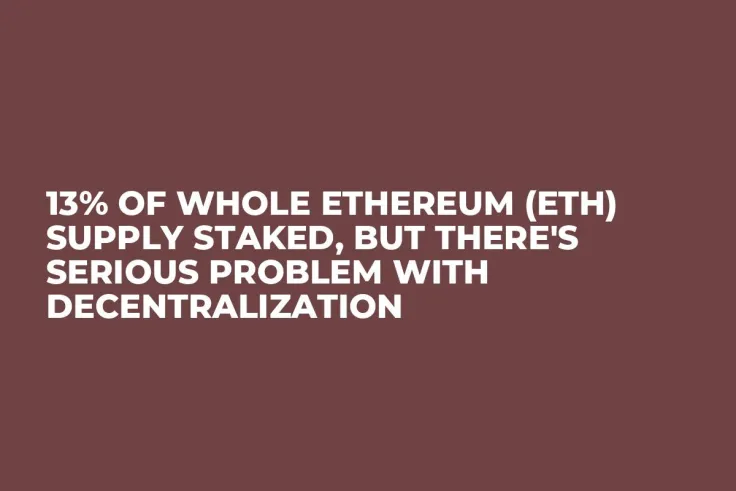
Disclaimer: The opinions expressed by our writers are their own and do not represent the views of U.Today. The financial and market information provided on U.Today is intended for informational purposes only. U.Today is not liable for any financial losses incurred while trading cryptocurrencies. Conduct your own research by contacting financial experts before making any investment decisions. We believe that all content is accurate as of the date of publication, but certain offers mentioned may no longer be available.
More than 10% of the whole supply of the second biggest cryptocurrency on the market has been staked and locked in smart contracts. While the on-chain data is impressive, we should highlight an important detail: 80% of the staked supply is controlled by only one entity, and it is a serious problem.
The total Ethereum deposited currently sits at 16 million, with more than 91,000 unique depositors and almost half a million unique validators. The impressive data behind Ethereum staking does not feel as reassuring after looking at the distribution of assets on the network: 4.6 million ETH is staked on Lido Finance, which makes it the biggest and most dominant entity on the network.
15.87 million $ETH ($19.3 billion) has been staked, accounting for 13.2% of all circulating ETH@LidoFinance is still the dominant LSD provider, commanding 80% of the market pic.twitter.com/rxHQmPnkkC
— Nansen 🧭 (@nansen_ai) January 3, 2023
Such a large possession of Ethereum in the hands of one organization might bring serious problems to both retail and institutional investors. Unfortunately, the problem is not only tied to the fact that Lido controls 80% of the staked supply. The issue is in Lido's liquidity and investment model.
In exchange for "real" staked and illiquid Ethereum, users receive liquid stETH tokens that should be tied to the real cryptocurrency at a 1:1 ratio. However, the token is inherently worthless, considering it is just a reflection of some staked value, and in cases of volatility spikes, the existing liquidity of the asset often becomes a serious problem. It causes decoupling and serious losses among investors.
Numerous on-chain analysts and experts expressed their concerns over the situation emerging around Ethereum. In addition to the high centralization of funds in the hands of only one entity, Ethereum is going through an extremely low utilization period that led to elevated issuance on the network.


 Dan Burgin
Dan Burgin Vladislav Sopov
Vladislav Sopov